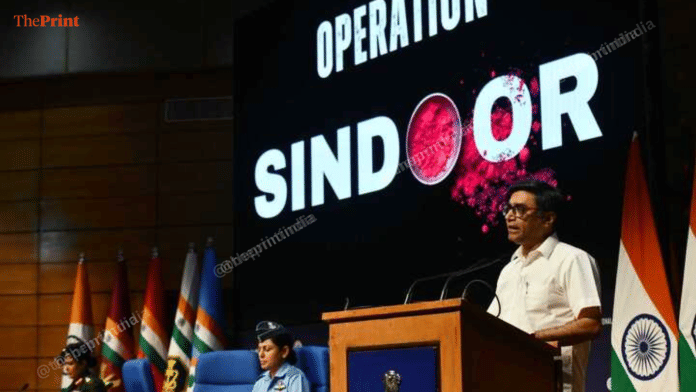New Delhi: Hours after India carried out Operation Sindoor to take out terror sites in Pakistan and Pakistan-occupied Kashmir (PoK), Foreign Secretary Vikram Misri categorically said that the strikes came in direct response to the Pahalgam terror attack, which was carried out by Pakistani and Pakistan-trained Lashkar-e-Taiba operatives.
The 22 April terror attack was not only aimed at killing innocents but also at fuelling communal tensions and derailing the return to normalcy in Jammu and Kashmir, he said at a press briefing Wednesday.
“Those behind the Pahalgam massacre were operating with full backing and shelter from across the border,” he said, underscoring that the Indian strikes were aimed at dismantling the infrastructure that enables such attacks.
“Pakistani and Pakistan-trained terrorists belonging to the Lashkar-e-Taiba carried out a savage attack on Indian tourists in Pahalgam,” Misri said. “They murdered 26 people, including one national of Nepal, causing the largest number of civilian casualties in a terrorist attack in India since 26/11.”
He noted that the attack was marked by “extreme barbarity,” with victims shot in the head at close range, often in front of their families. “Family members were deliberately traumatised through the manner of the killing, accompanied by the exhortation that they should take back the message,” he added.
Misri was joined by Colonel Sofiya Qureshi and Wing Commander Vyomika Singh, who provided operational details of the late-night military strikes. Later, Colonel Sofiya Qureshi confirmed nine terror camps were destroyed in Operation Sindoor.
Also Read: Fidayeen factories of Lashkar-e-Taiba in Muridke, Jaish in Bahawalpur targeted in Operation Sindoor
‘Calculated to cripple tourism, fuel communal tensions’
The Pahalgam attackers’ objective was to derail normalcy in Jammu and Kashmir, particularly by targeting the region’s tourism sector, the foreign secretary said.
“With a record 23 million tourists visiting the (Kashmir) Valley last year, the calculation, presumably, was that harming growth and development in the Union Territory would help keep it backward and create fertile ground for continued cross-border terrorism,” he said.
The attack, he added, also appeared designed to provoke communal tensions both in the region and across the country. “It is to the credit of the government and the people of India that these designs were foiled.”
The Resistance Front (TRF) had claimed responsibility for the 22 April terror attack initially. India had previously submitted reports to the UN 1267 Sanctions Committee in May and November 2024 for TRF, a front for the UN-proscribed and Pakistan-based Lashkar-e-Taiba.
“In December 2023, India had also informed the monitoring team about Lashkar and Jaish-e-Mohammad operating through smaller outfits like TRF,” Misri said.
Pakistan’s pressure to remove references to TRF from the 25 April UN Security Council press statement on the Pahalgam attack was “notable,” he said.
“Claims made by The Resistance Front and their amplification by Lashkar-linked social media handles speak for themselves,” he said. “Identification of the attackers based on eyewitness accounts and other evidence has also progressed.”
Misri reiterated that the Pahalgam attack fits into a broader pattern of cross-border terrorism and Pakistan’s “well-documented” record of providing safe haven to internationally designated terrorists.
“Pakistan also has a well-deserved reputation as a haven for terrorists from around the world,” he said, giving the example of 26/11 plotter Sajid Mir, who was declared dead but later found alive and arrested after global pressure. “The Sajid Mir case is the most glaring example.”
‘No demonstrable step to curb terrorism’
The Pahalgam attack had generated widespread public anger and prompted India to initiate a set of measures, including diplomatic actions announced 23 April, Misri said.
However, despite the passage of two weeks, “there has been no demonstrable step from Pakistan to take action against the terrorist infrastructure on its territory or territory under its control,” he said. “Instead, all it has indulged in are denials and allegations.”
Citing credible intelligence, Misri said that India’s security agencies had assessed that more high-casualty terror strikes were being planned. “Our intelligence monitoring of Pakistan-based terrorist modules indicated that further attacks against India were impending,” he said. “There was thus a compulsion both to deter and to pre-empt.”
“Earlier this morning, as you would be aware, India exercised its right to respond and to pre-empt and deter more such cross-border attacks.”
Describing the strikes under Operation Sindoor as “measured, non-escalatory, proportionate and responsible,” Misri said they were focused on disabling known terror infrastructure and neutralising operatives likely to be sent across the border.
He also recalled the UN Security Council’s 25 April statement on the Pahalgam attack, which underlined “the need to hold perpetrators, organisers, financiers and sponsors of this reprehensible act of terrorism accountable and bring them to justice”.
“India’s latest actions should be seen in this context,” the foreign secretary asserted.
(Edited by Tony Rai)






